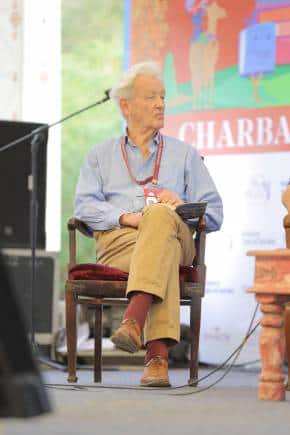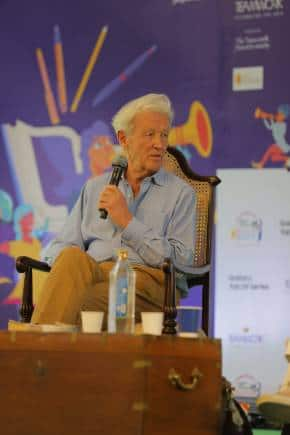



Award-winning British travel writer Colin Thubron is often regarded as the greatest living travel writer, a tag he says he does not take very seriously. In 2021, he released his 10th travel book, The Amur River: Between Russia and China which is an account of his travels along the Amur River from Mongolia to Russia and China. In a conversation, the 84-year-old author who is one the speakers at the ongoing Jaipur Literature Festival 2024, spoke about the discoveries he made during the research for his book and why he likes to travel alone. Edited excerpts:
 Travel writer Colin Thubron.You have written about Russia and China many times, so what made you embark on this particular journey?
Travel writer Colin Thubron.You have written about Russia and China many times, so what made you embark on this particular journey?Well, it was partly because I had written a great deal about these countries that it interested me to see where they collided together and this is the only place they do — the Amur River. For me, it is like a terminus — some people say of my own career (laughs) — it is where they finally meet one another. Also, because there is so little known of it.
An abiding memory from that trip?There are many, of course. Unfortunately, one of the most abiding ones is when I went to find the source of the river. Russia and China were always debating where the source lay, hoping it would be within their country. But actually, it is in the mountains of North East Mongolia. I went looking for the source in the marshlands, in the most remote parts. I was on horseback with three different guides. Their horses couldn’t cope with the marshes in the monsoon time and they threw me off. I had two broken ribs and a broken ankle. Mostly I have memories of the Russian and Chinese stand-off, I would say. Culturally they are different and they don’t communicate much at ground level. Beijing and Moscow are always talking politics together and making alliances but on ground, they do not love one another.
What are your tools as a travel writer? How do you get people to open up to you and tell you about things they might not say to others?It’s just fluke (smiles). It just happens. You can’t organise it. The great thing is to travel alone because then people are more likely to confide in you. They probably think you are lonely and they talk.
With the idea that the whole world is now in front of you with the click of a button on your screen, do you still find merit in travel writing?It’s an illusion that you are traveling by just looking at your screen. You are not vulnerable to it and you are not interacting with it. it’s a completely different thing when you actually travel. When you travel somewhere, you are exposing yourself to many things, to chance and to danger. It is a completely different sense you get of a country. That is why travel writing will and should survive. The book has to be a shared experience of the reader and the writer.
 Colin Thubron at JLF 2024.You are regarded as Britain's greatest living travel writer. How lightly/seriously do you wear that tag?
Colin Thubron at JLF 2024.You are regarded as Britain's greatest living travel writer. How lightly/seriously do you wear that tag?It is hard to imagine really (laughs), because travel writing is a difficult genre. It is not particularly popular at the moment; it was when I started and certainly in the 1980s it was much more popular. Now it’s diffused. To be called the greatest, it makes me a little sad for my friends who have preceded me (smiles). It is rather strange.
Any advice for young travel writers?Interact and go and try to shed your own culture as much as possible. Leave your self and culture behind and expose yourself to where you are. That is the most important thing.
Where are you going next? Your next trip?I love that question because at my age people say ‘you’re surely finished, aren’t you?’ (laughs) I’m writing a novel at the moment and I would like to return to China.
Discover the latest Business News, Sensex, and Nifty updates. Obtain Personal Finance insights, tax queries, and expert opinions on Moneycontrol or download the Moneycontrol App to stay updated!
Find the best of Al News in one place, specially curated for you every weekend.
Stay on top of the latest tech trends and biggest startup news.